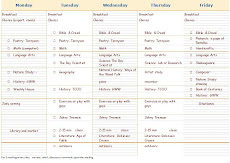The Narrative
Introduction
Retelling Narratives
- Condensed
- Expanded
- Slanted
The Description
Introduction
Methods of DescribingOrdering the Details
- Times
- Places
- Actions
- Persons
- Things
- Spatial
- Temporal
- Order of Impression
The Fable
Introduction
Retelling FablesAdapting Fables to Given Contexts
- Expanding -- dialogue
- Expanding -- description
- Expanding -- adding both
- Shortening a Fable
- Inventing a New Fable
- Adding a Moral Tag
- Adding a Fable to a Moral Tag
- Fitting the Fable into the Full Pattern
Proverbs
Introduction
Amplifying ProverbsRelating Parts to Whole
- Heaping up Aphorisms
- Giving Examples
- Giving Reasons
- Combining Reasons with Examples
- Developing the Full Pattern
- The Three Part Pattern
- The Standard Pattern
- OTher Possibilities
My ideas about what I want him to be able to do:
- Write simple stories -- written narration
- Use examples to support a point
- Generalize a point from an example
- Compile information or ideas from more than one source
- Improve oral narration and ability to discuss
- Research a topic with only a bit of guidance.
- "invent" topics and amplifications
- Condense longer things into shorter
- keep a book of ideas and examples as a source for invention.
Other things to fit in:
- Notetaking and Outlines
- Public Speaking (presentations)
- Summarizing from Notes
- The Precis
- Commonplace Book (copywork topically arranged)
- Research Skills (compiling information from 2 and more sources)
- Style (correlated with grammar -- work on description in relationship to modifiers, etc)
- Developing own topic (invention)
- Writer's notebook
Go through his books and make lists of topics to pursue. This is partly dependent upon what he shows an interest in.
References:



No comments:
Post a Comment